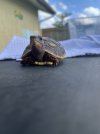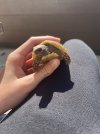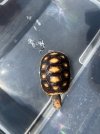Yoda_the_redfoot
New Member
I have a red foot tortoise he is about 5 month old right now. Pretty much since I got him which was almost 3 months ago he has had watery eyes and some snot bubbles. When I first saw this I immediately thought it was a respiratory induction so I brought him back and asked for help, this girl checked him and said that he was perfectly healthy and that the humidity and temp was just low. How ever even now 3 months later he still has the same problems it is a lot better now but still there. Humidity is at a constant 84-90 percent, and temp under hot spot is about 90 degrees and on the cooler side it is around 82-85 degrees. I don’t think it is a respiratory infection as he eats daily is very active, and also poops daily no signs that he is sick. Please can someone help me figure out what the problems is and how to fix it. You can’t see it in the pictures as it is not all the time


